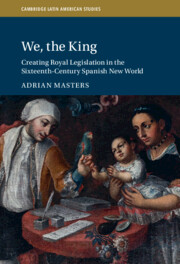Book contents
- We, the King
- Cambridge Latin American Studies
- We, the King
- Copyright page
- Dedication
- Contents
- Figures
- Tables
- Acknowledgments
- Prelude: A Peruvian Mestizo at the Spanish Court
- Introduction
- 1 Paper Ceremonies for a Global Empire
- 2 The Cocreation of the Imperial Logistics Network
- 3 Distant Kings, Powerful Women, Prudent Ministers
- 4 Lawmaking in a Portable Council
- 5 “Bring the Papers”
- 6 Creating the Royal Decree
- Pedro Rengifo’s Epilogue
- Conclusions
- Glossary
- Bibliography
- Index
- Other Books in the Series (continued from page ii)
3 - Distant Kings, Powerful Women, Prudent Ministers
The Gendered Creation of the Council of the Indies
Published online by Cambridge University Press: 02 March 2023
- We, the King
- Cambridge Latin American Studies
- We, the King
- Copyright page
- Dedication
- Contents
- Figures
- Tables
- Acknowledgments
- Prelude: A Peruvian Mestizo at the Spanish Court
- Introduction
- 1 Paper Ceremonies for a Global Empire
- 2 The Cocreation of the Imperial Logistics Network
- 3 Distant Kings, Powerful Women, Prudent Ministers
- 4 Lawmaking in a Portable Council
- 5 “Bring the Papers”
- 6 Creating the Royal Decree
- Pedro Rengifo’s Epilogue
- Conclusions
- Glossary
- Bibliography
- Index
- Other Books in the Series (continued from page ii)
Summary
Sixteenth-century Spain was at the vanguard of European collegiate bureaucratic rule and imperial governance. This chapter argues that although in the 1490s to 1540s council ministers’ operations were considerably patrimonialist, determined largely by each member’s family interests, by the 1540s to 1590s the Council became substantially more impartial. This occurred in large part due to the influence of women. Vassals’ attempts to shape ministers’ decisions via female connections prompted the council’s fundamental 1542 and 1571 guidelines. Subsequently, Madrid’s anxieties about women’s sway, and surfeits of Indies commodities, stirred misogynistic treatises, royal scrutiny, and an increasingly explicit masculine ministerial ethos. More concretely, monarchs and ministers feared that some of their colleagues and subalterns would become the playthings of court women, who themselves had connections with vassals seeking their cases’ resolution. The actions of indigenous artisans here were particularly notable, as subjects regaled female courtiers with their exquisite goldwork. The resulting backlash against powerful women ensured that gobierno petitioning did not become the domain of the powerful few in the 1500s, and the fiction of the council as mere instruments for the monarchs persisted strongly throughout the second half of the century.
Keywords
- Type
- Chapter
- Information
- We, the KingCreating Royal Legislation in the Sixteenth-Century Spanish New World, pp. 109 - 154Publisher: Cambridge University PressPrint publication year: 2023



